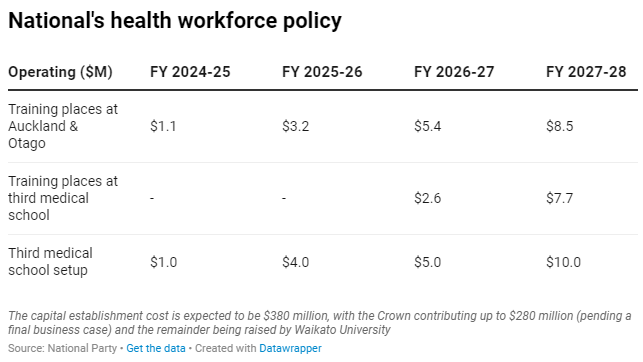
"Currently, New Zealand does not train enough doctors to meet the demands of our growing and ageing population, or to replace our retiring health workforce," Luxon said.
"The health sector is experiencing a workforce crisis. Sick and injured New Zealanders are waiting hours in emergency departments, weeks to see a GP and months on surgical wait lists," he said.
Luxon also promised to increase the number of medical school placements at Auckland and Otago by 50 from 2025. Luxon said this would be on top of the 50 extra places funded in the Budget.
"Together, this will see an additional 220 doctors graduating a year by 2030, compared to just 50 more under Labour’s plan," Luxon said.
"This medical school should have been started five years ago as the previous National Government planned. Labour cancelled it in 2018 and their short-sightedness means we will have to continue to rely heavily on immigration to increase our doctor numbers in the short term," he said.
National said the med school would cost $380m, with the Crown putting up $280m and $100m coming from Waikato University.
The additional places would cost $1.1m in 2024-25, then $3.2m in 2025-26, and $5.4m in 2027-28.

"Initially, the school will enrol 120 students, starting in 2027," the policy document said.
"The programme will involve training at Waikato University for the first year and at training centres located in regional hospitals and larger community medical centres for the remaining three years.
"This model of training-in-place in the provinces will ensure a sustainable supply of primary care doctors committed to serving provincial, rural, and high-needs communities," the policy document said.
Luxon said there were many talented students who missed out on med school places because the existing two med schools did not offer enough places.
"Increasing the number of medical training places available will help New Zealand retain students who are currently unable to secure placements at Auckland or Otago, leading them to pursue medical education offshore," the policy document said.
"The shorter training duration of the graduate medical school will also be attractive to older applicants and individuals with family commitments, for whom a six-year basic training programme can be challenging," it said.











